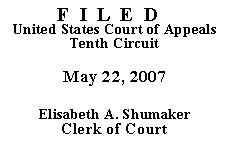

|
DARYL L. KINGSOLVER, Petitioner - Appellant, v. CHARLES RAY; and THE ATTORNEY GENERAL OF THE STATE OF COLORADO, Respondents - Appellees. |
(D.C. No. 1:00-CV-01102-WYD)
|
In 1988 Petitioner was convicted in state court of first degree and third degree sexual assault and sentenced to thirty-two years' imprisonment. On appeal, his conviction and sentence were affirmed. See People v. Kingsolver, No. 88-CA-1730 (Colo. Ct. App. Jul. 5, 1990) (unpublished). In 2000 he filed his first § 2254 petition under the Antiterrorism and Effective Death Penalty Act ("AEDPA"), raising seventeen claims. The district court denied the petition. On appeal, this court denied a certificate of appealability and dismissed. See Kingsolver v. Ray, 23 Fed. Appx. 899 (10th Cir. Nov. 16, 2001) cert. denied, 537 U.S. 844 (2002). In 2005, he filed a motion for authorization to file second or successive § 2254 petition raising six claims. The motion for authorization was denied. See Kingsolver v. Ray, No. 05-1387 (10th Cir. Oct. 31, 2005) (unpublished order).
In March 2006, approximately five years after the district court denied his first § 2254 petition, Petitioner Kingsolver filed a "motion for leave to amend issues in first § 2254 pursuant to FRCP 15(c)(2) or FRCP. 60(b)(6)" and a "motion for an order to certify a question of law to the Supreme Court of Colorado," seeking to raise claims he identified as amendments to previously raised claims. These amended claims included misjoinder of offenses; witness tampering; prior inconsistent statement by victim; trial errors based on admission of evidence of similar acts; insufficiency of evidence; sentencing errors; and ineffective assistance of counsel. He also asserted a claim based on Dunton v. People, 898 P.2d 571 (Colo. 1995), arguing that revisions to the state's first degree sexual assault statute required reversal of the trial court's denial of his challenge to jury instructions given by the court. In a March 23, 2006 Order, the district court denied the motion for leave to amend. In a March 24, 2006 Minute Order, the court denied the motion to certify. This appeal followed.
A post-judgment motion must be treated as a second or successive petition and certified by an appellate panel if it asserts or reasserts a substantive claim to set aside a movant's criminal conviction. See Gonzalez v. Crosby, 545 U.S. 524, 530-31 (2005) (deciding the extent to which a Fed. R. Civ. P. 60(b) motion filed in a § 2254 proceeding should be considered a second or successive habeas petition); see also Spitznas v. Boone, 464 F.3d 1213, 1215 (10th Cir. 2006) ("[u]nder Gonzalez, a 60(b) motion is a second or successive petition if it in substance or effect asserts or reasserts a federal basis for relief from the petitioner's underlying conviction.").
Petitioner Kingsolver's motions for leave to amend and to certify constituted an unauthorized second or successive § 2254 petition under the AEDPA. A review of the motions confirms that Petitioner sought to raise new substantive claims or reargue prior substantive claims challenging his 1988 criminal conviction. Consequently, Petitioner was required to comply with the relevant provisions of the AEDPA and obtain prior authorization from this court before filing this unauthorized § 2254 petition in the district court in March 2006. He failed to obtain this authorization. See 28 U.S.C. § 2244(b)(3)(A). Therefore, the district court lacked subject matter jurisdiction. See United States v. Gallegos, 142 F.3d 1211, 1212 (10th Cir. 1998) (per curiam). In light of this, we must vacate the orders denying the unauthorized § 2254 petition. See Coleman v. United States, 106 F.3d 339, 341 (10th Cir. 1997) (per curiam) (requiring transfer of unauthorized second or successive petition to appellate court); see also Spitznas, 464 F.3d at 1227 ("[s]ince the claim was successive . . . the district court . . . could only dismiss the petition or transfer it to us for certification.").
Nonetheless, we will construe Petitioner Kingsolver's appeal and appellate brief as an implied application under § 2244(b)(3)(A) for authorization to file a second or successive § 2254 petition. See Pease v. Klinger, 115 F.3d 763, 764 (10th Cir. 1997) (per curiam).
In his appellate brief, Petitioner reasserts the claims raised in his motions for leave to amend and to certify. After a thorough review, we conclude that Petitioner's claims do not establish the prima facie showing required by the AEDPA criteria in § 2244(b)(2). These claims are not based on a new rule of constitutional law made retroactive to cases on collateral review by the United States Supreme Court that was previously unavailable, id. § 2244(b)(2)(A), or on facts previously undiscoverable through the exercise of due diligence that would establish by clear and convincing evidence that he was not guilty of the offenses, id. § 2244(b)(2)(B). Several of Petitioner's claims are similar to those unsuccessfully asserted in his first § 2254 petition; moreover, the Dunton decision is a state supreme court decision, not a United States Supreme Court decision.
The district court's March 23, 2006 and March 24, 2006 Orders are VACATED. The implied application for authorization to file a second or successive § 2254 petition is DENIED. The motion to proceed in forma pauperis is GRANTED.
Entered for the Court
PER CURIAM
*. After examining the briefs and appellate record, this panel has determined unanimously that oral argument would not materially assist in the determination of this appeal. See Fed. R. App. P. 34(a)(2); 10th Cir. R. 34.1(G). The case is therefore ordered submitted without oral argument. This order and judgment is not binding precedent except under the doctrines of law of the case, res judicata, and collateral estoppel. It may be cited, however, for its persuasive value consistent with Fed. R. App. P. 32.1 and 10th Cir. R. 32.1.